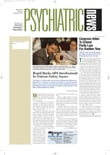Having trouble paying attention is no small problem for youngsters diagnosed with attention-deficit/hyperactivity disorder (ADHD). But for those who have ADHD plus a parent or sibling with schizophrenia, the combination may signal something more troubling—an especially high risk of developing schizophrenia themselves.
So suggests a study conducted by Matcheri Keshavan, M.D., a professor of psychiatry at the University of Pittsburgh Medical Center, and colleagues. Their findings are published in the January 2003 Schizophrenia Research.
It is known, of course, that difficulty paying attention is often a problem for relatives of persons with schizophrenia and a warning that those relatives might develop schizophrenia themselves.
However, it has been unclear whether this difficulty in paying attention is truly ADHD, and, if so, whether it represents an increase in the risk of developing schizophrenia beyond simply being a close relative of a person with schizophrenia. So Keshavan and his colleagues decided to conduct a study in hopes of answering these questions.
They used the Schedule for Affective Disorder and Schizophrenia for School-Age Children, as well as the Structured Clinical Interview for DSM Disorders, to identify 59 subjects for their study. Twenty-nine of the subjects had a parent or sibling with schizophrenia, and 30 had no close relative with schizophrenia and served as age- and gender-matched controls.
Results from the structured clinical interviews also revealed that of the 29 subjects who had a close relative with schizophrenia, 10 had no Axis I psychopathology; 10 had Axis I psychopathology other than ADHD, such as depressive disorder or oppositional defiant disorder; and nine had ADHD as their Axis I diagnosis. Thus, the attentional difficulties that the young relatives of persons with schizophrenia often have does indeed appear to be ADHD, Keshavan and his coworkers concluded.
Next the researchers determined whether, when a young person has ADHD plus a parent or sibling with schizophrenia, that represents an extra risk of developing schizophrenia beyond just being a close relative of a person with schizophrenia.To determine this, they gave each of their four groups of subjects—those with a close relative with schizophrenia and ADHD; those with a close relative with schizophrenia and no psychopathology; those with a close relative with schizophrenia and with psychopathology other than ADHD; and the healthy controls—tests that can reveal neurological signs of schizophrenia as well as tests that can identify likelihood of developing psychosis. For instance, if a subject agreed with the statement, “Parts of my body seem occasionally dead or unreal,” it would suggest that he or she was experiencing a perceptual aberration and was thus prone to develop psychosis. Or if the person disagreed with the statement that “good-luck charms don’t work,” it would imply that he or she was experiencing magical ideation and was thus at risk of psychosis.
Interestingly, subjects with a close relative with schizophrenia plus ADHD scored higher on the tests revealing neurological signs of schizophrenia than did healthy controls. This was the case whether the tests had to do with sensory integration, motor coordination, or motor sequencing. But even more revealing, subjects with a close relative with schizophrenia plus ADHD also scored higher on these three test categories than did subjects who had a close relative with schizophrenia but no psychopathology. They also scored higher than subjects who had a close relative with schizophrenia plus psychopathology other than ADHD.
As far as psychosis-proneness scores were concerned, healthy controls scored lowest; subjects with a close relative with schizophrenia but no psychopathology scored next highest; subjects with a close relative with schizophrenia plus psychopathology other than ADHD scored next highest, and subjects with a close relative with schizophrenia plus ADHD scored highest of all. This was the case whether magical ideation or perceptual aberrations were being measured.
Thus, it looks as though young people who have a parent or sibling with schizophrenia and who also have ADHD may be at very high risk of developing schizophrenia.
Keshavan and his team admitted in their study report, however, that only a long-term, prospective study, as well as a larger sample size, will reveal whether this is truly the case. They have already begun such an investigation, Keshavan told Psychiatric News.
The study was funded by the National Institute of Mental Health and National Alliance for Research on Schizophrenia and Depression.
The study, “Psychosis Proneness and ADHD in Young Relatives of Schizophrenia Patients,” can be accessed on the Web at www.sciencedirect.com/science/journals by clicking on “Schizophrenia Research,” and then “Volumne 59, Issue 1.” ▪
